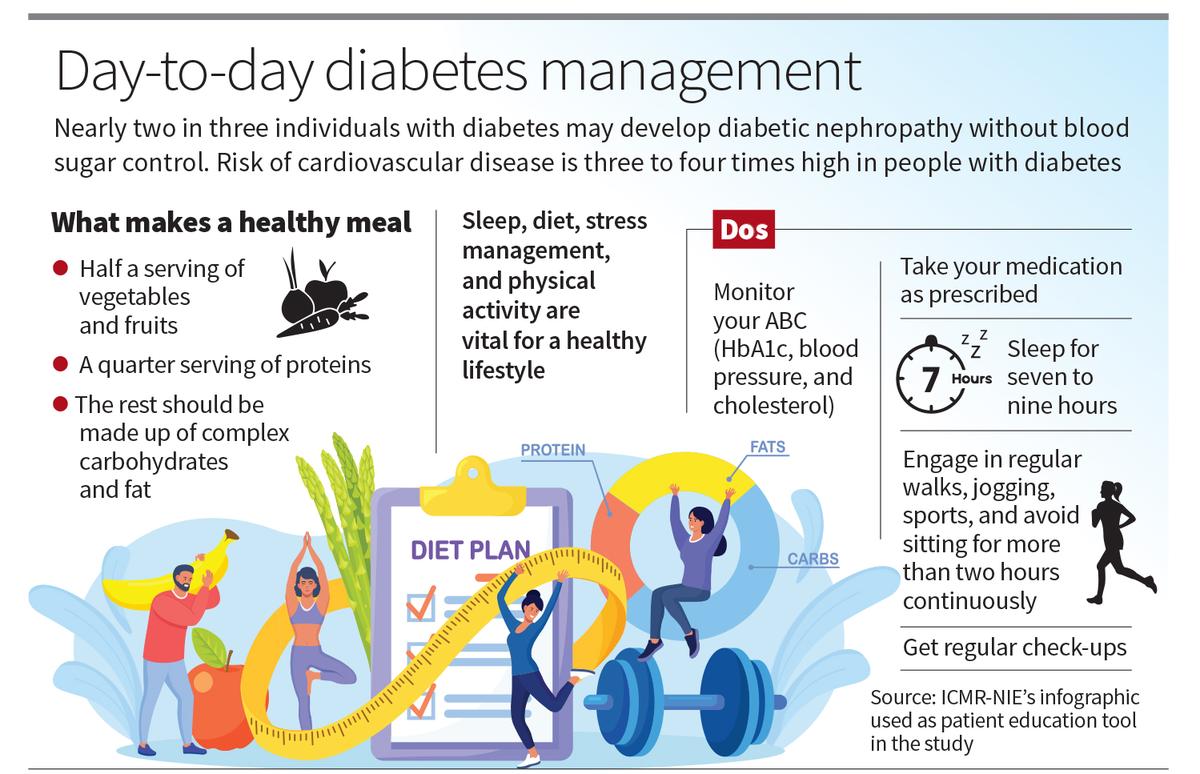A study among persons with diabetes in four zones of Greater Chennai Corporation (GCC) is looking at how educating them on nutrition could keep their blood sugar level under control and how self-care practices could help them in managing diabetes.
The Indian Council of Medical Research-National Institute of Epidemiology (ICMR-NIE), in collaboration with the GCC, has launched the study – “Effectiveness of low carbohydrate diet versus standard diet in individuals with type 2 diabetes mellitus: A C-RCT” – in Urban Primary Health Centres in Tondiarpet (zone IV), Thiru-Vi-Ka Nagar (zone VI), Valasarvakkam (zone XI) and Adyar (zone XII) zones. The one-year-long research is being conducted as a cluster randomised controlled trial.
“This study aims to provide nutritional advice to promote healthy eating, specifically focusing on reducing direct sugar intake and increasing the consumption of protein, healthy fats and complex carbohydrates, including vegetables and fruits. As a part of this study, a subset of participants will be offered the opportunity to wear continuous glucose monitoring (CGM) devices, which will track real-time monitoring of blood sugars without pricking each time. This will help us assess the impact of different foods on blood sugar levels for different individuals depending on their insulin sensitivity and further improve our understanding of suitable dietary interventions for individuals with diabetes,” Joshua Chadwick, Scientist B, ICMR-NIE, who leads the study, said. The study is funded by the Union Health Ministry’s Department of Health Research.
This is being implemented in all UPHCs in the respective zones. Persons with diabetes who come to the UPHCs for check-ups or to get their medications and having a HbA1c [average blood sugar level for three months] of 6.5 and above will be part of the study on obtaining their consent.
“Our research team will provide dietary intervention to them. With a subset of participants being given CGM devices, we will handhold and enable them to document sugar spikes and what food had caused the spike. For instance, if they had attended a wedding, they can check if the meal spiked their sugar level through the device. They will share the information with us on WhatsApp and will also have weekly reviews. We will check their HbA1C levels as well,” Dr. Joshua Chadwick said.
Manoj Murhekar, director of ICMR-NIE, said that taking medications as prescribed and monitoring blood sugar regularly is important for persons with diabetes. “An appropriate diet – half plate of fruits and vegetables, quarter of proteins and remaining quarter comprising complex carbohydrates and fats – is very important for glycemic control. Good sleep and physical activity are important too,” he said.
The study, he said, is to find whether educating persons with diabetes on a low carb diet, following medications and monitoring blood sugar levels would help in diabetes control in the community.
The researchers will build an algorithm and provide them with dietary interventions. “While eating less sugar would help in keeping blood sugar levels under control, we are also looking at the feasibility of whether providing double the quantity of dal in the Public Distribution System would help. We also have an infographic that is used as a patient education tool. We believe the findings will contribute valuable insights to public health, particularly for diabetes management and impact policy practice change,” Dr. Joshua Chadwick said.

Published – November 17, 2024 01:02 am IST

SEE ALL